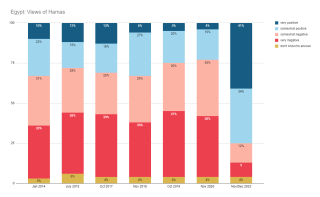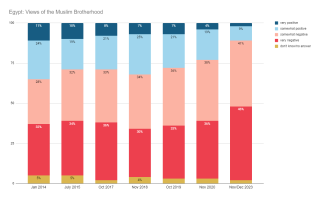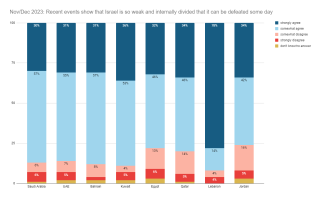
- Policy Analysis
- Fikra Forum
Egypt Polling Shows Rise in Positive Views of Hamas; Iran-Backed Groups and the Muslim Brotherhood Remain Unpopular

While Hamas has experienced a surge of popular support in Egypt, these views have not impacted those who say that they have a positive view of the Muslim Brotherhood. Iran’s proxies, namely Hezbollah and the Houthis, remained deeply unpopular among Egyptians.
A recent public opinion survey of Egyptian citizens, commissioned by the Washington Institute and conducted in November/December by a regional commercial firm, revealed that after years of adopting a negative view towards Hamas, three-quarters of Egyptians now view the movement positively, demonstrating the impact of the Israel-Hamas war on Egyptian public opinion. The majority of Egyptians continue to reject ties with Israel and Israelis, while Iran’s proxies remain unpopular, while the majority of Egyptians believe that the United States can put an end to the war in Gaza.
Regarding the United States’ role in the ongoing war in Gaza, the current poll showed that more than three-quarters of Egyptians agreed that “the U.S. is still in the best position to help end the war in Gaza, even if I disagree with its policies.” However, Egyptians are currently divided on the proposition that “We cannot count on the U.S. these days, so we should look more to other nations like Russia or China as partners.” While 57% of Egyptians agreed with this proposition, 42% disagreed.
In terms of the role that Arab countries should play in the ongoing conflict, the current poll showed mixed views. A significant majority of Egyptians (97%) demanded that Arab states take a tough stand against Israel and “immediately sever all diplomatic, political, economic, and any other contacts with Israel, in protest against its military action in Gaza.” Yet although not unanimous, over two thirds (69%) of Egyptians likewise agreed that “Arab governments should take a more active role in Palestinian-Israeli peacemaking, offering both sides incentives to take more moderate positions.” Moreover, an overwhelming majority (96%) of Egyptians believed that their country should provide more humanitarian aid to the Palestinians, even if that requires some practical coordination with Israel.
Notably, while Hamas has experienced a surge of popularity—in line with significant jumps among other Arab publics polled—these views have not impacted those who say that they have a positive view of the Muslim Brotherhood (MB). The current Egyptian government finds both the Muslim Brotherhood itself and its Palestinian offshoot threatening to domestic politics. For almost eight years, since the release of the Fall 2015 poll results, where Hamas received negative scores, the majority of Egyptians demonstrated a negative attitude towards Hamas. In contrast, the current poll shows that three-quarters of Egyptians view Hamas positively, while less than a quarter hold a negative view. Likewise, the large majority expressed agreement with the view that the war in Gaza is a win for the Palestinians, Arabs, and Muslims despite its human toll.
Moreover, while previous polling data showed that over one-third of Egyptians were inclined to oppose Hamas engaging in armed conflict with Israel, the current polling data showed that 86% of Egyptians disagreed with the statement that “Hamas should stop calling for the destruction of Israel and instead accept a permanent two-state solution to the conflict based on the 1967 borders.” Likewise, an overwhelming majority (94%) believe that Hamas did not kill civilians on October 7. This significant change in Egyptian public attitude towards Hamas can be attributed to three factors: the eruption of the war in Gaza, the rapprochement between Hamas and the Egyptian regime following the violent incidents of East Jerusalem’s Sheikh Jarrah neighborhood in 2021, and the softening of the Egyptian media discourse towards Hamas after the October 7 incidents.
Iran’s proxies, namely Hezbollah, remained deeply unpopular among Egyptians. Remarkably, the current poll shows that 79% of Egyptians voiced negative views about Hezbollah in Lebanon, while almost three-quarters agreed that "Iran, Hezbollah, the Houthis, and their other militia allies are actually unwilling or unable to help the Palestinians, no matter what they claim." The results are in line with the data released in a recent poll last October when 80% of Egyptians voiced a very negative view of Hezbollah, while an equal amount voiced a negative view of the Houthis in the Winter 2021 poll. It is unclear how the Houthis’ recent attacks on Red Sea shipping routes—which they attribute to the war in Gaza—has impacted Egyptian public opinion on this issue, although Houthi attacks had begun during the poll fielding period when this question about Iranian proxies was posed.
Though the rising support for Hamas among Egyptians might have been expected to positively impact support for the Muslim Brotherhood (MB), which has been outlawed as a “terrorist organization” by the Egyptian government, the recent survey showed that the number of Egyptians expressing a positive attitude towards the MB continues to drop. With a drop of 12 points from the Winter 2021 poll, the current poll shows that a mere 11% of Egyptians now view the Muslim Brotherhood positively. This is likely a particularly sensitive question for Egyptian respondents, but the steady downward trend from past polls is notable nevertheless.
As was the case prior to the war regarding Egypt and Israel’s “cold peace,” contacts with Israelis remain broadly unpopular. Though Egypt was the first Arab country to engage in formal diplomatic relations with Israel, there is still strong popular opposition against establishing informal ties with Israel or Israelis. Only 8% of Egyptians agreed with the proposition, “People who want to have business or sports contacts with Israelis should be allowed to do so.” This percentage remained low since the previous poll held in Fall 2022 when a mere 11% agreed with the same proposition. Only 2% of Egyptians agree with the statement that “I hope that we can be friends with Israelis someday because we are all human beings after all.” This negative attitude towards Israel reflects the wide gap between the public and the policies of its own government, which have been engaging in business and security relations with Israel since the signing of the peace treaty. Commenting on the current conflict in Gaza, 78% of Egyptians believed that “recent events show that Israel is so weak and internally divided that it can be defeated someday.”
Egyptians also see the war in Gaza in a religious context, but an overwhelming majority consider negotiations, not war, as the only means to reach an agreement. The majority of Egyptians also conceive the current war in Gaza as a war against both Islam or Christianity. According to the current poll, 94% of Egyptians are “sincerely worried that Israel wants to destroy the Al-Aqsa Mosque and our churches and harm our religion,” with no significant statistical difference between Muslim and Christian respondents. However, despite the negative attitude towards Israel, a majority of Egyptians still believe that peace between Israel and the Palestinians is attainable. In this regard, 86% of Egyptians believed that the conflict with Israel cannot be resolved militarily but politically. In line with that attitude, 84% of Egyptians either “strongly” or “somewhat” agreed with the proposition that “Right now, internal political and economic reform is more important for our country than any foreign policy issue, so we should stay out of foreign wars.”
Methodological Note
This analysis is based on findings from a survey commissioned by The Washington Institute and conducted by a highly qualified, experienced, and independent regional commercial survey firm. The survey comprised face-to-face interviews with a representative national sample of 1,000 Saudi citizens, selected according to standard geographic probability procedures. The contractor provided strict quality controls and assurances of confidentiality throughout the fieldwork, coding, and data processing. The theoretical margin of error for a sample of this size and nature is approximately plus or minus three percentage points.





